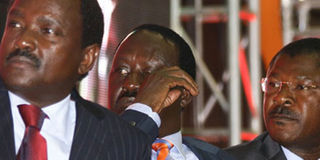A few tips for politicians’ manifestoes

Cord co-principals Kalonzo Musyoka (left), Raila Odinga and Moses Wetang'ula when they launched their manifesto at KICC on January 28, 2013. FILE PHOTO | NATION MEDIA GROUP
What you need to know:
- Despite the vibrant official public defence of the National Police Service, the fact that nearly two thirds of Kenyans believe it to be a major concern gives substance to the argument that it is in dire need of discipline and improved performance.
- Bearing in mind that the public interaction with the police is frequent, the criticism and concerns are based on experience, not speculative hype. The bottom line is that the service lacks credibility.
The chorus of pre-election promises is in full swing and will rise to a crescendo in the coming months.
In theory, election promises and manifestoes should be a fusion of what a candidate stands for and what the people want or need.
Sometimes they have too much theory and dogma of the former and not enough input of the latter. That means aspirants often make the error of representing themselves and their views more than the people who are casting the votes.
Arguably there is also the “yearn for” factor, which the likes of US President-elect Donald Trump managed to capture.
There are two important background factors. One is the cardinal rule of taking on board the demographics of your voting population and their circumstances.
Around 40 per cent of the Kenyan population is between 15 and 24 years. A further 25.5 per cent is between 25 and 54 years. That makes the median age 19.5 years. This means nearly two thirds of the population is in this bracket.
If we broaden the picture a little, the overall challenge facing many of them is finding adequate opportunities of gainful employment. The alternative is a toxic mix of much time on one’s hands, frustration, and idleness.
Another is the feeling of exclusion by so many in this bracket. Around 58 per cent believe that the government benefits a few groups and only 41 per cent believe that it benefits all.
If we throw the economic factor into the equation, we would need a growth rate in excess of 10 per cent to create and develop anywhere near the sort of opportunities we need. At around the current 6 per cent we still have some way to go.
Aspirants often make promises loaded with all sorts of goodies which, in theory, sound wonderful. But in practice, they are impossible to deliver in any realistic quantifiable form. They are unaffordable and would need a capacity that is simply not possible. Hence the healthy cynicism people have for politicians in many countries.
It is, therefore, important to look at what the priorities of many Kenyans are beyond the immediate one of getting by, day by day. According to a report by PEW Research Center, the highest priority is basic health care and the challenges of accessing it, with 77 per cent saying it is a priority.
Any interaction with the public health system bluntly tells you of long waits, shortage of staff and medicines and, all in all, a frustrating time before you are treated.
Following close behind at 74 per cent is poor quality schools. Providing basic elementary education for the majority of the country’s children nationwide is an immensely challenging task and inevitably, there are numerous logistical challenges and shortfalls.
At 64 per cent is government corruption and police misconduct. This is interesting because the basics of health care and adequate education stand out significantly ahead. But at the same time it is a telling reminder to the sceptics, especially in government, that they are indeed major priorities and concerns for many Kenyans.
It shows that the exposure of corruption by the likes of Raila Odinga and others touches a sensitive nerve for many. It also indicates that any genuine seriousness at tackling it would be electorally rewarding.
Despite the vibrant official public defence of the National Police Service, the fact that nearly two thirds of Kenyans believe it to be a major concern gives substance to the argument that it is in dire need of discipline and improved performance.
Bearing in mind that the public interaction with the police is frequent, the criticism and concerns are based on experience, not speculative hype. The bottom line is that the service lacks credibility.
What should incumbent and aspiring leaders take on board from these findings, which are based on research and are not mere statements and accusations?
Anyone who rubbishes them is clearly talking nonsense. If there is room for any shadow of doubt, it would be whether these statistics should be a couple of percentage points higher or lower.
They should be taken very seriously indeed. For those who wish to be re-elected, these findings should be included in their respective political campaigns.
As regards the former, the government should argue strongly that the work of the likes of Fred Matiang’i is in the right direction.
For those who are in the opposition and are aspiring for a political position, they should be the sticks with which to metaphorically beat the incumbents.
Mr Shaw is a public policy and economic analyst. [email protected]





